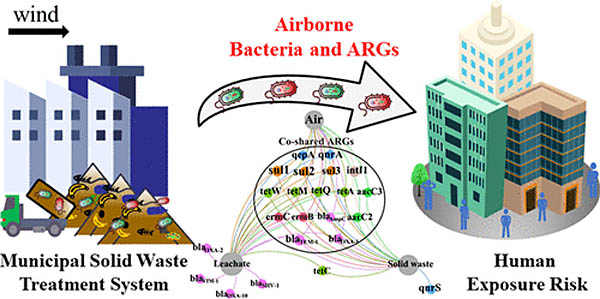
Breathing can be dangerous when bacteria and Antibiotic Resistance Genes travel through the air from municipal waste to humans. (Diagram from Environmental Science & Technology)
by Ian Angus
In my recent Monthly Review article, Superbugs in the Anthropocene, I discussed the growth of the antibiotic resistome, the worldwide pool of genes that enable bacteria to resist antibiotics. Such genes can concentrate in environmental hot spots, where resistance can easily spread.
“Hot spots, in soil and water as well as in hospitals, factories, sewage-treatment plants, and factory farms, provide excellent conditions for the spread of multidrug-resistant bacteria in local ecosystems and around the world.”
Add municipal landfills to that list.
Research published this week in Environmental Science & Technology, a journal of the American Chemical Society (ACS), concludes that trash buried in landfills or incinerated can be an important source of antibiotic-resistance genes in the air. Discarded medications accelerate the evolution of resistance in the bacteria that is found normally in garbage, and that endangers people who live downwind.
The ACS reports that Chinese researchers studied bacteria community and associated antibiotic-resistance genes in the municipal solid waste treatment system of Changzhou, a city in eastern China.
“The researchers collected air samples surrounding a landfill site, a municipal solid waste incinerator and two transfer stations (where garbage is delivered and processed). Air from both the municipal incinerator and the landfill site had higher levels of particulate matter and bacteria than upwind locations. The team identified 16 antibiotic-resistance genes in the air samples and tracked their source to municipal solid waste and leachate in the system. The genes were much more abundant in air downwind from the facilities than upwind.”
There is no reason to think that the Changzhou city dump is unusual. Most if not all waste landfills contribute to the spread of drug-resistant superbugs through the air, so just breathing can be dangerous.


